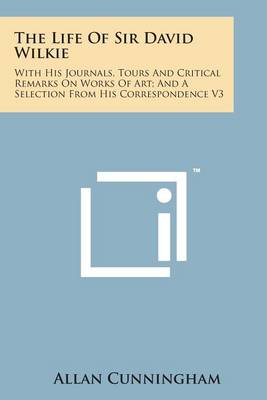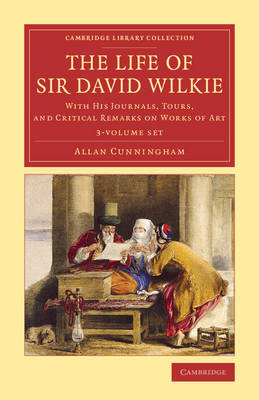Cambridge Library Collection - Art and Architecture
3 primary works • 5 total works
Volume 1
Sir David Wilkie (1785–1841) is often called the first truly international British artist. This three-volume biography, published in 1843, two years after Wilkie's sudden death while on a tour of the Mediterranean, and containing extracts from his journals and letters, remains an indispensable source for his life and works. Born in Scotland, Wilkie became a student at the Royal Academy in 1805, and in the following years the uncompromising realism of his scenes from rural life made his name known and attracted royal patronage: he was appointed 'the King's Limner in Scotland' by George IV. This work was compiled by his friend, the poet and critic Allan Cunningham (1784–1842), who himself died shortly after correcting the proofs: it was seen through the press by his son. Volume 1 traces Wilkie's life from his childhood, through student days, to his visit to Sir Walter Scott at Abbotsford 1817.
Volume 2
Sir David Wilkie (1785-1841) is often called the first truly international British artist. This three-volume biography, published in 1843, two years after Wilkie's sudden death while on a tour of the Mediterranean, and containing extracts from his journals and letters, remains an indispensable source for his life and works. Born in Scotland, Wilkie became a student at the Royal Academy in 1805, and in the following years the uncompromising realism of his scenes from rural life made his name known and attracted royal patronage: he was appointed 'the King's Limner in Scotland' by George IV. This work was compiled by his friend, the poet and critic Allan Cunningham (1784-1842), who himself died shortly after correcting the proofs: it was seen through the press by his son. Volume 2 follows Wilkie's life from 1817 to his extended study tour of Europe in 1828.
Volume 3
Sir David Wilkie (1785–1841) is often called the first truly international British artist. This three-volume biography, published in 1843, two years after Wilkie's sudden death while on a tour of the Mediterranean, and containing extracts from his journals and letters, remains an indispensable source for his life and works. Born in Scotland, Wilkie became a student at the Royal Academy in 1805, and in the following years the uncompromising realism of his scenes from rural life made his name known and attracted royal patronage: he was appointed 'the King's Limner in Scotland' by George IV. This work was compiled by his friend, the poet and critic Allan Cunningham (1784–1842), who himself died shortly after correcting the proofs: it was seen through the press by his son. Volume 3 continues the narrative from 1828, through Wilkie's appointment as the King's Painter in Ordinary in 1830, to his early death.
Sir David Wilkie (1785-1841) is often called the first truly international British artist. This three-volume biography, published in 1843, two years after Wilkie's sudden death while on a tour of the Mediterranean, and containing extracts from his journals and letters, remains an indispensable source for his life and works. Born in Scotland, Wilkie became a student at the Royal Academy in 1805, and in the following years the uncompromising realism of his scenes from rural life made his name known and attracted royal patronage: he was appointed 'the King's Limner in Scotland' by George IV. Travels in Europe and the Middle East enabled the study both of Old Masters and of the landscapes which had inspired them. This work was compiled by his friend, the poet and critic Allan Cunningham (1784-1842), who himself died shortly after correcting the proofs: it was seen through the press by his son.
Sir David Wilkie (1785–1841) is often called the first truly international British artist. This three-volume biography, published in 1843, two years after Wilkie's sudden death while on a tour of the Mediterranean, and containing extracts from his journals and letters, remains an indispensable source for his life and works. Born in Scotland, Wilkie became a student at the Royal Academy in 1805, and in the following years the uncompromising realism of his scenes from rural life made his name known and attracted royal patronage: he was appointed 'the King's Limner in Scotland' by George IV. This work was compiled by his friend, the poet and critic Allan Cunningham (1784–1842), who himself died shortly after correcting the proofs: it was seen through the press by his son. Volume 2 follows Wilkie's life from 1817 to his extended study tour of Europe in 1828.


